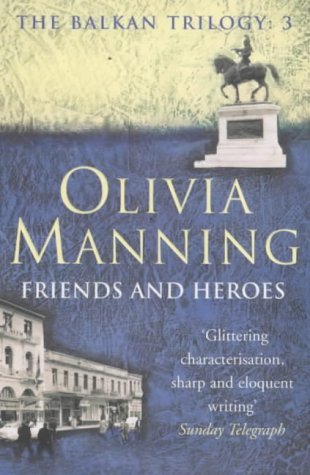Friends and Heroes by Olivia Manning (Book Review)

At the end of The Spoilt City Harriet Pringle finds herself alone in Athens having fled Romania after the anti-British Antonescu regime took power and deposed Carol II. Her husband, Guy Pringle, has been left virtually alone in Romania to represent the British Commission. As she walks around the city and finds she knows no one, she is despondent. A character prone to anxiety, Harriet wonders whether Guy will make it out of the country alive given his stubbornness and political sympathies (being a Marxist). She is relieved to encounter their old acquaintance Prince Yakimov, who has otherwise been a pest to her in the series so far. Yakimov’s job working for the British Legation allows him to discover that Guy is alive and on his way to Athens. As Friends and Heroes begins Harriet is waiting for Guy on an airstrip. She misses him dearly but is also aware of the fragility of their relationship.
[B]ut during the warm, dusty summer days when they first met, it had been the shadow of an avalanche about to drop. Having nowhere else to turn, people turned to each other.
Harriet tends to avoid discussing politics with Guy. Their temperamental differences draw them to different ideologies. Guy defends Harriet to his left-wing friends as a “romantic” rather than a “reactionary”. Though superior in knowledge, Guy’s Stalinist sympathies would ultimately to be shown to be on the wrong side of history. There is a cringe-worthy moment when Guy defends the Molotov-Ribbentrop Pact from a Soviet perspective. Harriet’s instinct to rebel against the cold analytical framework of scientific socialism seems discerning in retrospect. Though even her sagacity is put into question by the sympathy she showed to the political idealism of the fascistic Iron Guard movement in The Spoilt City. Manning does a good job and ensuring that the characters’ views are not anachronistic and are loyal to the ideas that were around at the time.
“But you must sacrifice your individuality,” Guy told her. “It’s nothing but egoism. You must unite with other right-thinking, self-abnegating people – then you can achieve anything.”
The idea filled her with gloom.
Having read the entire Balkan Trilogy I can now see why Athony Burgess described the Fortunes of War cycle as “the finest fictional record of the war produced by a British writer.” Here are just a few examples of the author’s excellent prose.
While he whoofed with laughter, his coarse-featured, putty-coloured face slipped about like something too soft to hold its shape, and he clutched at his pipe, the only stronghold in a world where anything might happen.
From a distance the columns had a luminous whiteness; now she saw that on the seaward side they were bloomed with an apricot colour. In a state of wonder, she moved from column to column, touching each as though it were a friend.
As in The Spoilt City, the Pringle’s experience with the Greek locals varies with the tides of war. Athens’ mood is a sombre one as Mussolini’s forces invade Albania and begin to issue territorial demands to Greece. However, the Italian’s incompetent invasion of Greece in October 1940 leads to a series of triumphant Greek counter-attacks that push the Italians back the Adriatic. The characters are hopeful that this Greek victory will not lead to a German intervention. Surely Hitler is enjoying Mussolini’s bungling as much as the Allies? Of course the public was unaware that Hitler wanted Greece taken out of the equation before Operation Barbarossa would begin in the summer of that year. By April 1941 the church bells that rung out to celebrate the triumphs of Klisura had long passed. After Germany declared war on Greece, British troops were stationed in the country. Before the initial onslaught there was a sense of grim determination, and many Greeks believed the British troops would be able to stabilise the sector. Australian soldiers are disappointed to find out that the Greek women will not dance with them out of loyalty to their men at the front. Unfortunately for the Allies, the Wehrmacht would conquer Greece in less than a month. The country would be another military disaster in Britain’s growing list from Dunkirk to Norway.
Friends and Heroes takes place over a span of roughly six months before the British are forced to flee to Egypt as the German mechanized forces barrel towards the capitol. Unlike in Bucharest, the British social circle in Athens is much for established. Harriet is surprised to find that some of the British just live “there”, with our without a job. Guy struggles to find a job working for the Commission as his former underlings, Dudebat and Lush, have assumed positions as lecturers for which they are unqualified. The pompous Professor Lord Pinkrose from the previous book has been appointed as head of the organization in Athens. His sole concern is giving a lecture on Byron.
“You could be right,” Guy said and looked dashed, as he usually did when Harriet revealed the prosaic wiring that lay behind the star-bursting excitements of life.
Guy has a strong aversion to unemployment after having seen the emotional costs his working class father suffered from during his childhood. He also has a lingering sense of guilt that he was able to avoid going to Cairo after leaving Romania, which was where he was expected to travel to for further consignment. Unable to teach while gainfully employed, Guy throws himself into preparing lectures for classes he is unlikely to give and organizing English lessons for the Greek locals. When Guy is not engaged in his passion projects, he spends time with Ben Phipps – an ugly and anti-Semitic Marxist whom Guy treats with an undeserved respect. Avoiding Ben whenever she can, Harriet prefers to associate with Alan Frewen, an older gentleman and a passionate Grecophile who never goes anywhere without his dog Diocletian.
On the train to Bucharest, she had watched him surrounded by admiring Rumanian women, his face alight as though with wine, his arms extended to embrace them all. To someone so enamoured with the general, could the particular ever really mean anything?
He was eager that she should share his joy in the company’ while she, doing her best to smile, was eager only to escape it. Forcibly held in the centre of uproar, she bore the situation as long as she could, then managed to get away. He glanced after her, a little puzzled, a little grieved, wondering what more she could want.
With Guy being emotionally inaccessible, Harriet begins to fall for the young and handsome Charles Warden. There is an instant attraction between the two, and the young army officer offers a temperamental and passionate figure she could never have in her husband. After more than a hundred pages of will-they-won’t-they, Harriet is ready to have an affair with Charles when a former student of Guy’s shows up to break the spell of the moment. Charles realizes he will never have Harriet, and their relationship becomes distant. As the Pringles board the last ship out of Athens, Harriet realizes that though she and Guy have an unbreakable bond, she is no longer naive about the nature of their marriage.
She remembered when she had wanted him to take over her life. That phase did not last long. She had soon decided that Guy might be better read and better informed, but, so far as life was concerned, her own judgement served her better than his. Guy had moral strength but it resembled one of those vast Victorian feats of engineering: impressive, but out of place in the modern world.
